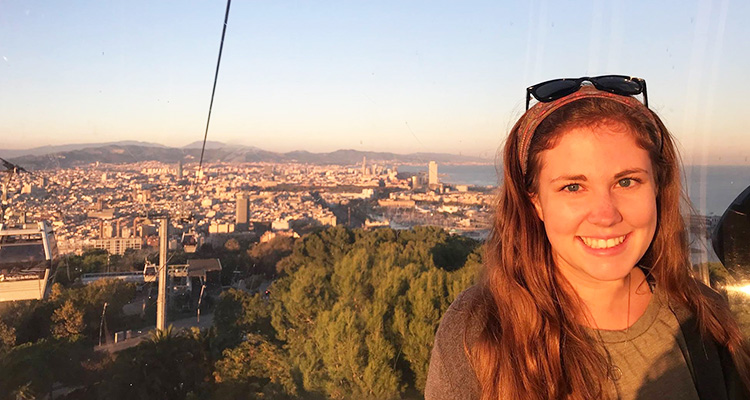 Editor’s note: Three women who hail from Wheeling — Jordan Miller, Karen Laska, Morgan Harris — have been awarded Fulbright scholarships. Weelunk writer Ryan Norman corresponded with them amid their preparations for travel and research, and got a glimpse of how they’ve each arrived at this honor. In the conversations with them, you’ll find a young girl imploring house guests to read to her, you’ll learn what Zimna Wojna means, and you’ll hear about a winner of the Karl Popper Prize for Global and National Affairs. Today, meet Jordan Miller.
Editor’s note: Three women who hail from Wheeling — Jordan Miller, Karen Laska, Morgan Harris — have been awarded Fulbright scholarships. Weelunk writer Ryan Norman corresponded with them amid their preparations for travel and research, and got a glimpse of how they’ve each arrived at this honor. In the conversations with them, you’ll find a young girl imploring house guests to read to her, you’ll learn what Zimna Wojna means, and you’ll hear about a winner of the Karl Popper Prize for Global and National Affairs. Today, meet Jordan Miller.
After she graduated from WVU, she accepted a job as a communications specialist in the office of the provost, having majored in English with a concentration in professional writing and editing with minors in journalism and women’s and gender studies. During her college career, she amassed a litany of honors.
Jordan leaves tomorrow, Aug. 26, for her Fulbright experience.
What follows is writer Ryan Norman’s Q&A with Jordan.
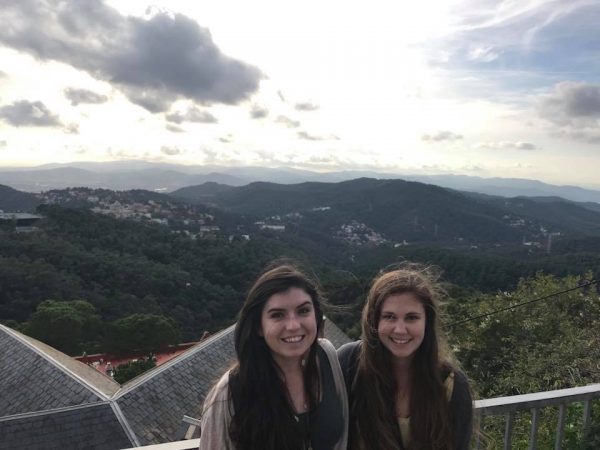
Ryan: Do you recall coming to see that school was your thing?
Jordan: I had a teacher in elementary school, Mrs. Lennox (she has since retired, I believe), who told me I would be a writer. I didn’t think much of it until my junior year of high school when I took AP English with Jamie Johnson. She was one of the first to really take an interest in my writing in my early adulthood, and taught me how to write strategically, clearly and passionately in a variety of styles. Because of her class, I felt that I was good at writing and decided to major in English, which spiraled into a passion, several jobs and a gateway to a lot of other opportunities.
Ryan: What clubs or sports have you enjoyed?
Jordan: I was co-captain of the soccer team in high school and was a member of Young Patriots choir at Park. In college, I was a member of a few community service clubs, but none of them have been super notable.
Ryan: Have you always been on the path that the Fulbright will be advancing? Were you ever interested in something totally different?
Jordan: I think language and communication and a general love for words have always been a part of my path. When my parents had guests over as a child, as early as 2 years old, I would go to my bookshelf and grab a stack of books, then promptly hand them to the guest and plop down in front of them expectantly, waiting to be read to. As a kid, I shuffled through a lot of typical and unrealistic “When I grow up…” dreams: pediatrician, professional soccer player, CD cover designer, flight attendant, food critic, etc.
My career goals really started to take shape in college when I started learning what I was good at and how I could use that skill set to help people. Currently, after Fulbright, I hope to run communications for a nonprofit.
Ryan: College is getting more and more expensive. And not as many people today are able, nor desire, to go to a traditional university for four years. Having just had that full college experience and now moving on to another educational opportunity is even more uncommon than usual. How have you made college a reality for yourself? Have there been summer jobs, work-study programs, other scholarships?
Jordan: I’m luckier than many people my age in that I have an incredible safety net in my parents, who I never doubted would support me and help to make my education happen if I were not able to myself.
However, I’ve also been incredibly lucky to be the recipient of many scholarships, locally in Wheeling and through WVU, that made it easy for me to comfortably pay for school without needing to take out any loans.
I also have to give a shout-out to my soccer coach and former Park teacher Luke Hladek. He took me on as a student aide in his history class my senior year of high school, and when I wasn’t busy helping him with handouts and PowerPoints, he let me sit in the corner and fill out scholarship applications and study for the ACT. It really made a big difference to have a set amount of time every day to dedicate to thinking about my future and to find and pursue different funding opportunities.
In addition to these scholarships that paid my tuition, room and board, I’ve also been working part-time and over the summers to save money and cover the rest of my expenses. The Community Foundation for the Ohio Valley has a great summer fellowship program that allowed me to do meaningful, resume-building work at home in Wheeling, and I worked several writing jobs in Morgantown over the years, including for the school paper (The Daily Athenaeum), WVU Extension Service, in a linguistics lab (The West Virginia Dialect Project) and as an intern in WVU’s Provost Office.
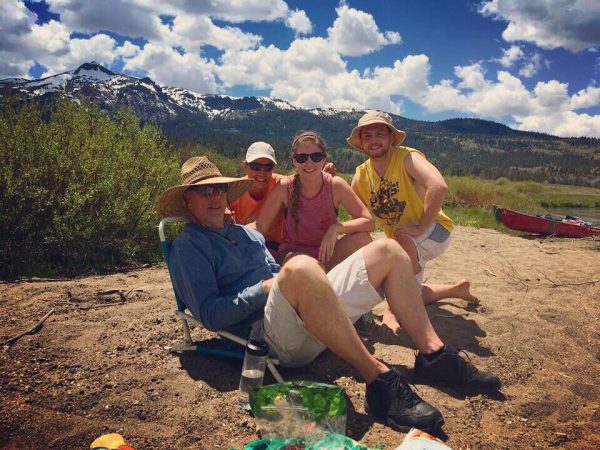
Ryan: Have you won other academic awards or scholarships along the way?
• Phi Beta Kappa — Alpha Chapter
• Summa Cum Laude Distinction
• Sigma Tau Delta National English Honorary
• Eberly Scholar 2016 and 2018
• WVU Helvetia Sophomore Honorary
• WVU Presidential Merit Scholarship
• WVU Elizabeth Gorrell Harris Scholarship
• WVU Margaret Jackson Deeds Scholarship
• Faris Steinbecker Memorial Scholarship
• Phyllis A. Beneke Scholarship
• David Slaysman Memorial Scholarship
Ryan: With so many schools reducing their offerings to “practical, marketable majors,” which often takes the form of eliminating humanities, there is less opportunity for people to get the kind of well-rounded education it seems you have received. What do you think about the state of the university?
Jordan: Working for my university’s vice president for academic affairs, I am aware of a lot of different academic programs, outreach initiatives and non-academic activity that go on in all our colleges at WVU. I appreciate whole-heartedly the value of STEM for the state of West Virginia and am amazed every day at the amazing things my colleagues here are doing to ensure a prosperous economy and educated future generation in our state. A couple cool examples include the WVU Center for Excellence in STEM Education, the WVU Neuroscience Institute, an incredible amount of research in opioid addiction and rural health, among so many others that I could name.
However, what I’ve run into in my role as a university writer and public relations professional, is that none of this means anything if we can’t communicate it to the general public and make it accessible within the context of the real people of our state — their lives, their experiences and their struggles.
I have been lucky to have a fairly well-rounded education, but my classes in the humanities are where I acquired the skills that allow me to acknowledge and appreciate the work being done here in STEM, and translate and communicate it out so it can impact the greatest number of people and continue to improve the quality of life for people of our state.
STEM and all its related fields are great, essential even, to our future. But beyond the labs and the prototypes, the drugs and the robotics, people need to feel that we are connected as humans, and that is where the humanities come in: writing, art, creativity and intelligent discussion are where we make a real difference in people’s lives, in my opinion.
In my view, STEM and the humanities are two sides of the same coin — we need to learn and appreciate both in order to become a better society.

Ryan: What has been the process of getting involved with the Fulbright Program?
Jordan: When I decided I wanted to apply for a Fulbright in early September [2018], I first met with Cate Johnson in WVU’s ASPIRE Office, who sat me down and went through the list of countries with me, helping me to brainstorm what experiences and goals I have that we could match up to build a successful application. After that, I wrote my drafts, had an informal interview with our internal Fulbright committee, then revised them three or four times until I was ready to submit. After that, it was a waiting game until semi-finalists were announced in January, and then again until I learned I had been awarded the grant in mid-March.
Ryan: When did you become aware that such a thing exists?
Jordan: My sophomore year, my lab manager at the West Virginia Dialect Project and good friend, Savanah Alberts, won the Fulbright Scholarship to teach English for a year in Senegal, which not only introduced me to the program but also sparked my interests in education abroad.
Ryan: What/who prompted you to apply?
Jordan: My academic advisor and current acting dean of WVU’s Honors College, Dr. Ryan Claycomb, planted the seed in my brain while I was still a sophomore, I think. And then slowly nudged me toward it until I decided to apply. WVU also has an incredible ASPIRE Office that assists students in writing applications for international scholarships, fellowships and graduate degree programs. (Check them out at aspire.wvu.edu — they’re amazing at what they do and some of the kindest, most intelligent people I’ve ever met.)
Ryan: How and when did you learn that you’d earned a scholarship? Was it a nervous moment of opening a letter in the mail (or clicking to open an email)?
Jordan: Fulbright notifications trickle out at different dates throughout the spring based on what country you’ve applied to. The notification window is anywhere from March to May, but I was lucky to be one of the first of the WVU applicants to be notified. I had been checking my email pretty much every 10 minutes for months waiting on it, and when an email with the subject line “Congratulations on your Fulbright Scholarship” came in, I was pretty much in a state of disbelief.
Ryan: What will you be doing with you Fulbright? What will you study? Where will you go?
I will teach English to teenage students in the Catalan Quadrilingual school system in the Principality of Andorra (a micro-state in the Pyrenee Mountains between Spain and France).
Ryan: What might you have done if you hadn’t been selected?
I had planned to move to D.C. this summer to try to find a job in the nonprofit sector, which still may happen upon my return.
Ryan: I see from a previous Weelunk story that you’ve been studying the language and culture of West Virginians and Catalans. Do you see parallels in these two peoples?
Jordan: I do. While we have very different histories and cultures, Catalans and West Virginians have both battled oppressive regimes in which their leaders were not completely understanding of their economic, cultural and political situations. For example, Just over 40 years ago, when the Franco regime controlled Spain, the Catalan language was banned completely.
The contemporary separatist movement in Catalonia in Spain is much more complicated than I can answer in a paragraph, but to me, what it comes down to is that Catalonia is one of the most economically prosperous regions in Spain, but the Spanish state itself does not always consider their individual cultural interests and needs, even though it collects a lot of state revenue from the region (and Barcelona in particular as a tourism hub). The people want more autonomy, but Spain is hesitant to grant them that, which has led to political clashes, technically illegal referendums for regional independence/succession, political prisoners, state police violence, etc.
BUT I digress. Catalans are incredibly passionate about their history, culture, food, music, language, etc. Which is something I also see from a lot of people in West Virginia, as they fight to tell their own stories in the face of a national news media that wishes to distill us down to a politically backward coal state with an opioid problem.
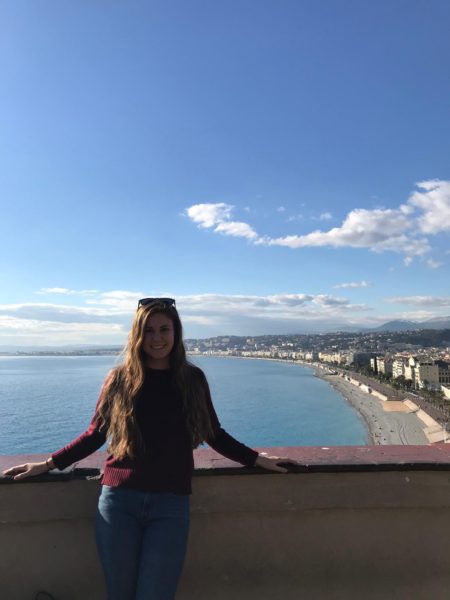
Ryan: What did you do for the West Virginia Dialect Project? Were you recording people’s speech and trying to notate and capture pronunciation and unique coinages? Did you create something like a dictionary?
Jordan: At WVDP, we take audio recordings from interview subjects from all over the state and feed them into a vocal analysis program called “PRAAT.” We use this program to splice and separate their vowels from the rest of the words, and then feed them through the program to map them onto where they are produced in the mouth. We then compare these by county. You can see that the farther south you go, the more open the vowels become, typically. Additionally, we are able to map phenomena like “mergers,” where a subject’s two vowels may be indistinguishable (i.e., the front-lax merger, which merges the vowels of “pin” and “pen,” so that the only way you can distinguish the words may be from sentence context).
The goal of this research, however, is not just to study the occurrences and differences between these vowels by county. Dr. Kirk Hazen, the lab’s director, is a nationally renowned socio-linguist and uses this data to make arguments about the way language and dialect are used by people to create and express their identities, communities, heritage and more. By looking at the way vowels vary by age, race, class and geographical location, we are able to draw conclusions about the ways that language is essential to who we are as people. More info here.
Ryan: From your studies abroad, who are artists and thinkers that we should know more about?
Jordan: More than specific thinkers and artists, I would encourage people to seek out different, foreign perspectives in general. Growing up in Wheeling, I didn’t have many chances to interact with people that had a different upbringing and collection of experiences than I did, so traveling has been a great way to gain empathy with different groups of people and learn about their experiences and challenges navigating the world; and to discover that everyone you come into contact with has something to teach you or a unique perspective to offer.
If you don’t have the resources or opportunities to travel and meet these people yourself, I would encourage you to find documentaries on different cultures. My favorites (and perhaps the most accessible) of these are some of the international food and cooking documentaries on Netflix. (Salt, Fat, Acid, Heat; Cooked; and Chef’s Table are some of my favorites. I’ve also heard very good things about Street Food and plan to watch it next.)
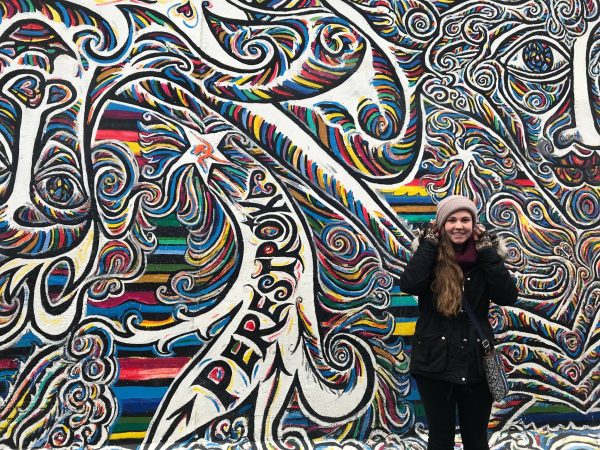
Ryan: Is there a dish you’ve discovered that we should try?
Jordan: Paella, a traditional Spanish rice dish, is the best thing I’ve ever eaten. Pan Amb Tomaquet (bread with tomato) is a Catalan breakfast dish I still eat many mornings in America.
Ryan: From that Weelunk article again, I glean that you know some Catalan and Spanish. How many languages do you know? And how do you learn? Textbooks? Speaking partners from your travels? Duolingo?
Jordan: English is, obviously, my first language. I have been taking Spanish classes on and off in school since I was about 12 years old and would describe myself as an intermediate speaker, comfortable conversationally but nowhere near fluent.
When I studied abroad in Barcelona, I took a crash course in Catalan, but it’s so far from traditional Castilian Spanish that I haven’t picked up more than the basics — hello, goodbye, good morning, my name is, please, thanks, OK, where is, you have, etc. I have these basics down for a lot of the languages spoken in the places I traveled while abroad in 2017 as well — Italian, Portuguese, Czech, German.
I use Duolingo and old textbooks at home to keep up with my Spanish and am trying to do the same to get basic French down before I leave in August. Sometimes I also try to watch movies and TV in Spanish and listen to Spanish music just to keep it fresh in my mind.
Ryan: Do you have long-term plans? Is there a career you are aiming for? Do you hope to live in another country for most of your life?
Jordan: I hope to continue traveling for the rest of my life; there are so many places I’d like to see and cultures I’d like to experience and learn from. However, there is a good chance that Fulbright will be the only time I live abroad for such a long period of time. I know I am going to miss my family and friends a lot, and living abroad is exhausting in a way that’s intellectually fulfilling but difficult to articulate. Even if I’m not physically here, I know West Virginia will always be home to me.
Upon returning, I may go to graduate school to get a master’s degree in integrated marketing communications, nonprofit management or something else. I have a lot of interest in progressive politics, mental health advocacy, food justice, public education, grant writing and PR, so I will likely follow these passions via whatever opportunities present themselves. I don’t have a specific career in mind at this point in time (and if I do, it is likely to change within the next few months!).
• Ryan Norman hails from a suburb of Cleveland and earned an English degree at Wheeling Jesuit University. He lives in East Wheeling where you might find him listening to Gustav Mahler or Keith Jarrett, reading David Foster Wallace or Dave Eggers, and thinking along with Martin Heidegger and Roger Scruton. Ryan is also a chorister at St. Matthew’s Episcopal Church and a member of The Prosers, a group that performs original poetry and prose at Towngate Theatre.


